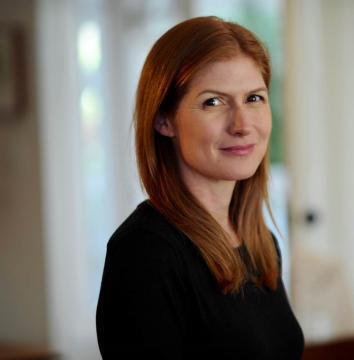Maile Meloy is best known for writing intricate but economical family sagas in which the characters’ tangled lives are refracted through a dozen or so different perspectives. Every member of the brood views the goings-on in a custom-made cast of light. In 2003, Liars and Saints recounted the multigenerational history of a sprawling Catholic clan in California, and then, in 2006, A Family Daughter depicted the earlier novel as the creation of one of its own fictional characters, a writer who has retold her relatives’ stories for her own reasons. Stories spiral out of stories in Meloy’s fiction, like fractals endlessly elaborating to fill all the available space. Her plots seem less like plots than webs, but the most wizardly thing about her novels is that none of this makes for an airless intellectual exercise; instead, Meloy’s books are effortlessly readable and sweetly gossipy, even if they are nearly impossible to summarize.
Meloy is also the author of a fine series of middle-grade fiction, beginning with The Apothecary. Writing for young readers requires a more straightforward storytelling approach, and one of the characters in Meloy’s new adult novel, Do Not Become Alarmed, a film executive with two young children, recalls being exasperated by a book her son adores, “one of those wish-fulfillment kid’s adventure books where the boy hero has exactly the qualities he needs to triumph, at every moment.” Now this woman, Liv, berates herself for having tried to explain her adult appetite for realism and ambiguity to the boy. “Who wanted a kids’ book to feel like real life?” she asks. “Real life is fucking intolerable.”
Liv has excellent reasons for that sentiment. Her son and her daughter, along with four other children, are missing. The novel begins with Liv, her husband, her cousin Nora and her husband, and that couple’s son and daughter boarding a cruise ship for Latin America. I’d list all these people’s names, if that wouldn’t be confusing in the way reviews of Meloy’s novels often can be. A posh Argentinian couple befriends them onboard, and that couple also has a daughter and son, teenagers who seem impossibly glamorous to the younger American kids. So, all in all: Three couples and six children, three brother-and-sister pairs. At some point, almost every one of those characters—plus a handful of others they meet along the way—gets a chapter told from his or her point of view. This sounds insanely complicated, but like all of Meloy’s novels, Do Not Become Alarmed glides along with a clarity that’s almost uncanny. How did she turn a contraption this elaborate into a page-turner?
At first the cruise (Liv’s idea) is perfect. While the American couples like to think of themselves as above such a thoroughly packaged form of recreation, in truth it’s a tremendous relief. First, there’s the buffet, which eliminates the endless meal planning that takes up so much of parenthood. “The low-grade anxiety about the next meal,” Liv thinks, “started when you were cleaning up the last. … That roving hunter-gatherer part of her brain, which sucked a lot of power and made the other lights dim—she could just turn it off.” Then there’s the Kids’ Club, where hearty young New Zealanders amuse the children and promise to keep an eye on the insulin monitor worn by Liv’s diabetic 8-year-old. That leaves the parents free for grown-up dinners and sex.
The illusory nature of any sense of safety is one of the themes of Do Not Become Alarmed, and early on, the two youngest American children get briefly lost on the ship, triggering a panic that evaporates almost as soon as it forms. It’s the sort of thing that happens to all of us now and then, a glimpse of the abyss we need to forget about if we’re going to go on functioning. The real crisis comes during an off-ship expedition in an unnamed country that sounds a lot like Costa Rica. A series of minor accidents leads to an impromptu swim at the mouth of a river. One mother wanders into the jungle to “look for birds” with the handsome guide. The two mothers left on the beach doze off. When they wake up, all six children and the inner tubes they were floating in are gone, carried up the river by the incoming tide.
Sometimes you get lucky, and sometimes you really, really don’t. While the frantic parents enlist an assortment of unsatisfactory officials in the search for their kids, the kids themselves fall into the hands of a pair of brothers, local drug kingpins. The perplexed kingpins stash their prisoners in their comfortably bourgeois house, a situation that looks much different to the chirpy American 6-year-old (who is given a pet rabbit by one of the brothers) than it does to the sullen and perilously pretty Argentinian 14-year-old or an 11-year-old boy with one toe on the autism spectrum. The kingpin brothers don’t get along, to put it mildly. Their longtime housekeeper thinks they’ve finally gone too far. There’s an escape attempt, a car chase, a train-hopping, and at long last an intersection with what initially seems an entirely disconnected subplot about a 10-year-old Ecuadorean girl trying to join her undocumented parents in Nueva York.
On its surface, this is a classic what-would-you-do? thriller meant to elicit the vicarious horror of a core readership of middle-class moms. Neither of the two American mothers copes well. Liv’s self-image as an organizational ninja breaks down, and Nora—who’s undergoing an identity crisis befitting her Ibsenian name—spirals further into the transgression that she believes brought on this catastrophe. All of the characters blame themselves to some extent, but from the lofty perspective of the novel itself, it’s obvious how deluded they are. Causality, the mirage that events and actions are linked to each other in an intelligible and therefore controllable sequence, is one of the pleasures that stories give us, making us feel that the universe we inhabit is governed by forces that can be understood and directed. Thrillers generally work this way, roping in the ever-reliable opposition of Good and Evil: The bad guys set the plot in motion, and then the good guys put the world back in order again.

Maile Meloy
This is not, however, how Meloy tells it. Her stories are intersections of happenstance and character. If this man had not decided to go golfing because it seemed like the manly thing to do … If that tire had not blown out, threatening to ruin Liv’s perfect vacation plans … If the sun had not been so hot that day and the mothers so lulled by their guide’s expertise … If the children had not swum ashore at this particular spot … If a paper bag had not fallen out of a child’s pocket … Each of these seemingly inconsequential, accidental incidents changes the course of fate, often in momentous ways. Do Not Become Alarmed proves that you don’t need hackneyed thriller devices to generate powerful momentum and suspense.
Only one character in Do Not Become Alarmed is exiled from Meloy’s empathy, a truly bad guy, although far from the Satanic masterminds behind most thriller plots. Her characters fail, annoy, betray, and puzzle each other, but once their author shows us the story through their eyes, their behavior always make sense and often results from factors they perceive as beyond their control. The problem is, each of them lives in a world shaped by his or her own personality, and sometimes these worlds barely connect with each other. Other writers would find irresistible opportunities for satire in a novel about affluent Americans negotiating a crisis in a foreign country and the juxtaposition of a coddled child turning up her nose at a banana with brown spots with a less fortunate one who wonders if she will ever see her grandmother again. But Meloy isn’t interested in caricature or delivering the conventional moral judgements we’ve come to anticipate from a premise like this.
The gentleness of Do Not Become Alarmed is particularly striking in Meloy’s portrayal of the American parents, who come with fully installed sets of impeccably liberal values. Nora’s husband is a black film actor, famous enough to be recognized now and then, and nods are made to his mistrust of the police and anxiety about his children’s future back home. Nora herself stews with suppressed outrage when she thinks that the other mothers at their private school are trying to twist the story into a satisfying parable: “[T]here were lots of kids who didn’t get to their parents, who didn’t get papers.” Liv is not terribly convincing as a Hollywood executive; her family’s child-care arrangements are left suspiciously vague when, in truth, someone in her class would have long ago jobbed out the task of planning her kids’ next meal. As acute as the stress of losing their children in Latin America becomes, as badly as they behave to each other, these Americans never become quite as ugly as you might expect them to.
In place of the edge other novelists would bring to this material, readers of Do Not Become Alarmed get Meloy’s warmth and her even-tempered, protean imagination. Her view of human nature is almost Olympian in its refusal to take sides, in the consideration it affords to characters who would be mere bit players in a more conventional work. This novel is a bait and switch in the best possible sense. It promises readers easy-to-identify-with protagonists in a pair of mothers going through a parent’s worst nightmare. Then it presents them with so much more, a richer, broader palette of people to believe in and to understand.
—
Do Not Become Alarmed by Maile Meloy. Riverhead.
